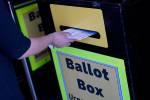Habitual truants may lose right to drive
Skip school, lose your license.
Since Jan. 1, that’s the consequence looming over Nevada high school students who are habitual truants.
For the first time in state history, those younger than 18 who apply for a driver’s license must prove they’ve attended at least 90 percent of school days in an ongoing semester. Students are required to submit a certificate of attendance, signed by a school administrator, to the Department of Motor Vehicles office.
Students who fall short of the 90 percent attendance requirement can be denied a license or have it suspended. The law, Senate Bill 269 passed by lawmakers in 2013, allows up to 10 unexcused absences per semester before a student loses their right to apply for a driver’s license.
“Driver’s licenses are a big bonus for kids,” said Clark County School District Assistant Superintendent Tammy Malich this month. “I think this is a situation that has spoken loud and clear, and it’s going to make an impact.”
For students who are licensed, the conditions are stricter. After just three unexcused absences, a student declared a “habitual truant” can have his or her license suspended: for 30 days after the first three unexcused absences, 60 days for the next unexcused absence, and an additional 60 days for every absence after that.
In Clark County School District high schools, if a student has three unexcused absences, they’ll have an opportunity to rectify at least one of them before facing a hearing with a school assistant principal or dean.
Within three days of any unapproved absence, a parent can call the school and ask for it to be excused.
“If a parent says their kid is sick, we believe them,” Malich said.
But if school officials don’t hear from parents after three unexcused absences, a school administrator will call the students and parents to a hearing within a week of the latest absence, said Malich.
In the meeting with a dean or assistant principal, parents will be required to provide official documents, such as hospital records or signed doctors notes, to have an absence excused. Otherwise the case will be handed over to school police.
“At that point, we’d ask the officers to come in, take the driver’s license, write a truancy citation, suspend the driver’s license and mail that license and form to the state DMV office in Carson City,” Malich said. “We’re going to physically take it and we’re going to send it to Carson City.”
Once that happens, students who want a new license will have to reapply at a local DMV office after the suspension is over.
Since all suspensions are relayed through school police to the DMV, Malich said a student reapplying for their license won’t need to obtain a new DMV 301 form, which is the certificate of attendance.
“The DMV will have a record of when the student is eligible to reapply,” she said.
Malich said the new law did not come with state funding to implement it. But it hasn’t immediately resulted in administrators, attendance clerks or school officers having to work additional hours.
“Schools have always been expected to enforce attendance,” she said. “This is just one more incentive to help them do that.”
Students interviewed at Rancho High School were indifferent to the law and don’t think it will be effective.
Kyera McIntosh, a junior at the school near Washington Avenue and Bruce Street, lives nearly 17 miles from campus. Without being able to drive, students who aren’t within walking distance of school won’t improve their attendance, she said.
“This isn’t going to solve the problem totally,” McIntosh said. “It’s just going to increase the number of people driving illegally.”
Other students, like Rancho senior Dalton Wilkinson, aren’t covered by the law. Recently turned 18 years old, Wilkinson has the right to his driver’s license despite any absences.
“If anything, it’s just annoying,” Wilkinson said. “I’m always at school regardless, but that wouldn’t apply to me anyway.”
State Sen. Aaron Ford, D-Las Vegas — who authored the legislation and sponsored it with seven other senators and three members of the Assembly — says the law stands for student accountability.
“One of the best ways to empower students is to hold them accountable,” Ford told the Review-Journal. “They need to be responsible for their own actions and the education process.”
Ford wrote and helped pass the legislation in 2013 in an attempt to increase the state’s graduation rate. Nevada ranks last in the United States with a high school graduation rate of just over 60 percent.
“Thoroughly, we have an issue in this state,” Ford said.
Not all Nevada politicians were in favor of the new law.
Assemblywoman Maggie Carlton, D-Las Vegas, was one of 15 Assembly members who voted against the measure.
Carlton argues the policy will strain already overworked Nevada high schools instead of helping students.
“We ask the schools to do so much, we’re just asking them to do more and more,” Carlton recently said. “It’s just one more unnecessary thing that parents have to do with their kids and one more thing the schools have to deal with.”
Carlton added that schools should focus more directly on truancy instead of taking away student driver’s licenses.
“I would hope kids would want to go to school whether they’re getting a driver’s license or not,” Carlton said. “If truancy is a problem, then let’s address that.”
Contact reporter Chris Kudialis at ckudialis@reviewjournal.com or 702-383-0283. Follow him on Twitter @kudialisrj.




























